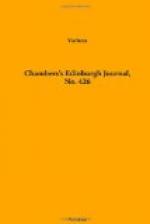Having thus cleared away to some extent all those who stood in the way of his views, Robespierre bethought himself of acting a new part in public affairs, calculated, as he thought, to dignify the Republic. Chaumette, a mean confederate of Hebert, and a mouthpiece of the rabble, had, by consent of the Convention, established Paganism, or the worship of Reason, as the national religion. Robespierre never gave his approval to this outrage, and took the earliest opportunity of restoring the worship of the Supreme. It is said, that of all the missions with which he believed himself to be charged, the highest, the holiest in his eyes, was the regeneration of the religious sentiment of the people: to unite heaven and earth by this bond of a faith which the Republic had broken, was for him the end, the consummation of the Revolution. In one of his paroxysms, he delivered an address to the Convention, which induced them to pass a law, acknowledging the existence of God, and ordaining a public festival to inaugurate the new religion. This fete took place on the 8th of June 1794. Robespierre headed the procession to the Champ de Mars; and he seemed on the occasion to have at length reached the grand realisation of all his hopes and desires. From this coup de theatre he returned home, magnified in the estimation of the people, but ruined in the eyes of the Convention. His conduct had been too much that of one whose next step was to the restoration of the throne, with himself as its occupant. By Fouche, Tallien, Collot-d’Herbois, and some others, he was now thwarted in all his schemes. His wish was to close the Reign of Terror and allow the new moral world to begin; for his late access of devotional feeling had, in reality, disposed him to adopt benign and clement measures. But to arrest carnage was now beyond his power; he had invoked a demon which would not be laid. Assailed by calumny, he made the Convention resound with his speeches; spoke of fresh proscriptions to put down intrigue; and spread universal alarm among the members. In spite of the most magniloquent orations, he saw that his power was nearly gone. Sick at heart, he began to absent himself from committees, which still continued to send to the scaffold numbers whose obscure rank should have saved them from suspicion or vengeance.




